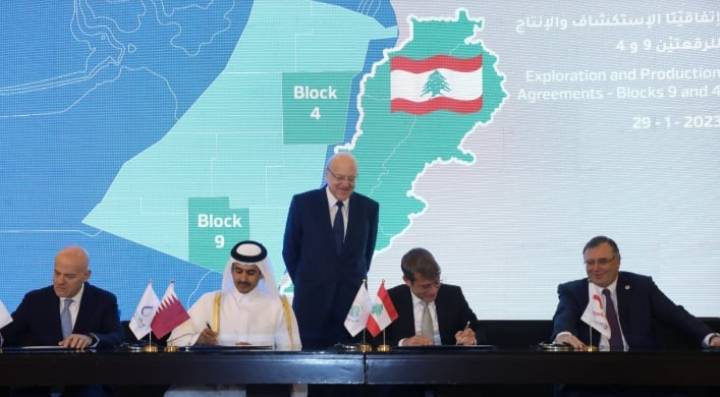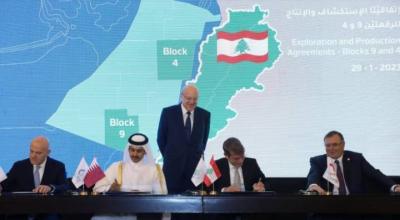The grim scene enveloping the country has been interrupted by the signing of exploration and production agreements in blocks 4 and 9 after Qatar Energy entered a consortium with French TotalEnergies and Italian Eni. This will expedite preparations to commence drilling possibly in the third quarter of this year, as announced during the signing ceremony. However, the focus remains on demonstrating transparency in managing this file, from drilling to extraction, which requires legislation including the establishment of a sovereign fund— a demand the Progressive Socialist Party has persistently advocated for, having submitted a detailed proposal regarding it. Oil expert Lori Haitian stated in an interview with "Al-Anbaa" electronic that the scene we saw with the visit of the CEO of Total and the Qatari Minister of Energy to Beirut is an indication of support for the demarcation agreement, emphasizing that Total will begin drilling, but this process requires time. She noted that what happened was the "start of preparatory work awaiting the arrival of the drilling rig to begin exploration in the third quarter of this year, with serious drilling expected to commence in early 2024, at which point the natural results will emerge, which is what we stated before the agreement. The company has put a work plan in place, and everything is proceeding as planned," considering that "drilling must start to confirm the existence of gas or not, and this step is called exploratory drilling," expressing hope that "the result will be positive with two of the most important exploration companies in the world involved."
Regarding the general situation in the country, it is evident that political, judicial, living, health, and educational crises are likely to persist in the absence of effective solutions, with those in power preoccupied with their own issues, showing little concern for the struggles of the Lebanese people. Amid the blockage of political channels, it remains uncertain whether Speaker of Parliament Nabih Berri will schedule a session to elect a President of the Republic next Thursday, February 2. It is also unclear whether the Supreme Judicial Council will convene this week or if this matter will remain pending until an appropriate decision is made.
Yesterday, two prominent positions were recorded, the first from Maronite Patriarch Mar Bechara Boutros al-Rahi, who offered support to investigative judge Judge Tarek Bitar by urging him to continue his investigations into the Beirut port explosion until the truth is revealed, a stance that is considered a rejection from Bkirki of any attempts to pressure Judge Bitar into withdrawing from the investigation. This was commented on by former MP Joseph Issac, who questioned: "Is there no one with a clear conscience who does not want the truth? Is it conceivable that a massive explosion like the port explosion that killed hundreds and injured thousands and destroyed half the capital would not prompt a demand for the truth to be revealed?" He called on Bitar to "not retreat from uncovering the truth and issuing his indictment, stating that if he succeeds, we will say he has succeeded, and if he errs, we will say he has erred, while those who demand his dismissal for certain reasons thereby implicate themselves as they are clearly pointing to their guilt."
The second position yesterday was indicated by a near announcement from the head of the Free Patriotic Movement, MP Gebran Bassil, of his candidacy for the presidency, further complicating the presidential file and linking it to the failure of his efforts to agree on a candidate's name, or if his movement's demands, particularly the implementation of decentralization, are not met, as he stated. Bassil continued his campaign against Army Commander General Joseph Aoun, accusing him of usurping the powers of the Minister of Defense. Issac viewed Bassil's attack on the Army Commander as part of a strategy to destroy the country’s institutions, as they had done with the energy and telecommunications sectors, noting that today they work to destroy the judiciary. In an interview with Al-Anbaa electronic newspaper, Issac contended that "Bassil speaks as if he comes from Honolulu, forgetting that they are the foundation of the destruction of all ministries and institutions they have managed since 2011, which were mostly service ministries." He added: "If there is corruption, they are at the heart of that corruption, and if there is conspiracy to sell Lebanon to the Iranian axis, it is they who sold it," suggesting that "the attack on the Army Commander is likely driven by vested interests."
In response to Bassil’s call for a Christian-Christian alliance, Abd al-Masih stated: "We have tried them; what was the result?" Regarding Bassil's demand for administrative decentralization, Issac pointed out that "the Lebanese Forces were the first to call for administrative decentralization since Lebanon can only evolve through expanded decentralization," adding that "Bassil raises the idea of decentralization when it serves his interests and withdraws it whenever he pleases, and this position falls within the framework of maneuvering."
Financially, financial circles anticipated that the Sayrafa platform would increase from 38,000 to 45,000 lira, meaning that all matters needing resolution are postponed until further notice. This also means that all attempts to stabilize the exchange rate of the dollar and the ensuing terrifying inflation are failing, leading to an exacerbation of living crises for the people, with no solution in sight as long as the channels of dialogue continue to be blocked among the main political forces.




